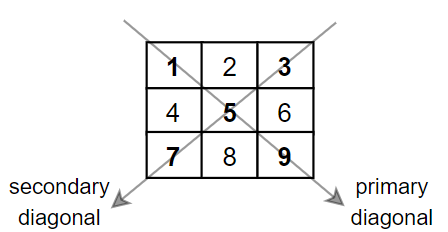Class Solution
java.lang.Object
g1501_1600.s1572_matrix_diagonal_sum.Solution
1572 - Matrix Diagonal Sum\.
Easy
Given a square matrix `mat`, return the sum of the matrix diagonals.
Only include the sum of all the elements on the primary diagonal and all the elements on the secondary diagonal that are not part of the primary diagonal.
**Example 1:**

**Input:** mat = \[\[**1** ,2, **3** ],
[4, **5** ,6],
[**7** ,8, **9** ]]
**Output:** 25
**Explanation:** Diagonals sum: 1 + 5 + 9 + 3 + 7 = 25 Notice that element mat[1][1] = 5 is counted only once.
**Example 2:**
**Input:** mat = \[\[**1** ,1,1, **1** ],
[1, **1** , **1** ,1],
[1, **1** , **1** ,1],
[**1** ,1,1, **1** ]]
**Output:** 8
**Example 3:**
**Input:** mat = \[\[**5** ]]
**Output:** 5
**Constraints:**
* `n == mat.length == mat[i].length`
* `1 <= n <= 100`
* `1 <= mat[i][j] <= 100`
-
Constructor Summary
Constructors -
Method Summary
-
Constructor Details
-
Solution
public Solution()
-
-
Method Details
-
diagonalSum
public int diagonalSum(int[][] mat)
-